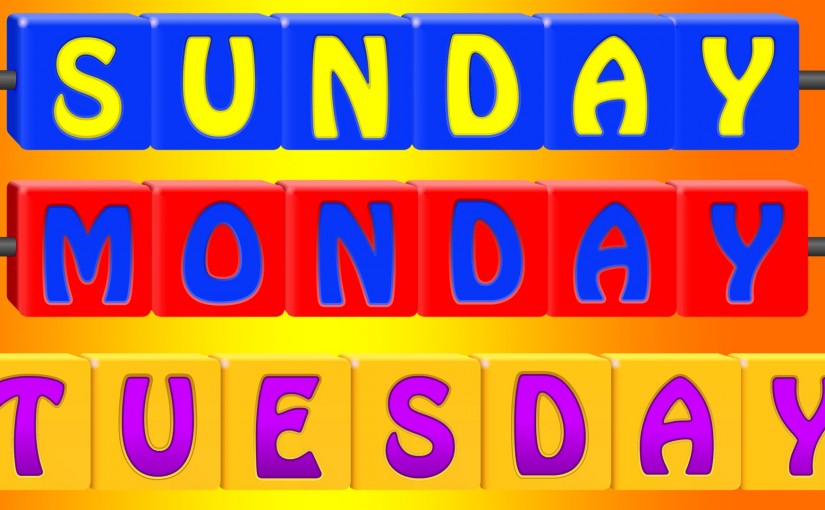In his website Smart Passive Income, host Pat Flynn, also the author of Will It Fly, describes how he sets a different theme to every day of the week. This helps him focus on a certain project for the day by pushing everything else to other days with respective themes. Read about it in the “Communication and Calendar” section here.
I have already discussed how I use a calendar to schedule my days. However I soon realised that a calendar has its limitations. In Pat Flynn’s podcast with Mike Vardy, they discuss how a calendar is an example of horizontal scheduling and how it leads to focus being fragmented and on particularly distractive days, how nothing gets done.
The solution is to use a concept called day-wise themes.
What is theming?
Let’s say that you are working on 3 projects this season. You are writing a book, building a software project and maintaining a blog. Besides you also have your full time job which goes from 9 to 5. You decide to work on your projects from 5am to 7am, then from 7pm to 9pm and finally from 10pm to 11pm. That gives you 5 hours per day. How should you divide the time? You can do it such that your 5am to 7am time is taken for writing your book, the 7pm to 9pm for software and the 10pm to 11pm slot for blogging. This seems to make sure that every project gets some amount of time every day. This is called horizontal scheduling, where slots for each project are scheduled every day.
Alternatively, you can set it up such that all 5 hours are dedicated to a single project per day. You can do something like book writing on Mondays and Thursdays, software on Tuesdays and Fridays and blogging on Wednesdays and Saturdays. This style of setting up your schedule is called theming. You get to pick a theme to work on an entire day and push everything else aside to their respective themed days.
Why theming is beneficial?
Here are some benefits of theming compared to non-themed schedules.

- The brain works on momentum. Momentum is gained when you work on a single task with undistracted focus. Trust me, momentum takes time to build. If you have ever sat to write a blog post or a book, you know. The brain needs to be forced to focus and think for the best part of the first five minutes, until it settles into a focus mode. By picking a theme to work for an entire day, you are forcing the brain to focus narrower and deeper, getting it to perform at its best. On the contrary, putting too many varied tasks on your calendar means that you will keep switching between them while working on each of them for too little time, not giving your brain a chance to delve deep into the task.
You can read about why you should spend large chunks of uninterrupted time on a single task here. - There will always be days with distractions. A sudden visitor or a phone call that you may like to attend to, rather than ignore. Suddenly, an entire project slot on your calendar is taken up and you do not get to work on that project for that day at all. In Utopia, you would ignore the phone call or a visitor, but the real world is different and you should plan with distractions in mind.
Theming a day works differently. Since you have allocated several hours to one project, a little distraction doesn’t throw the project off course. You have sufficient time to catch up.
Please note: You should still deal with distractions as they deserve, which is to ignore them completely or deflect them for later. It is just that theming by day absorbs the effects of distraction better than horizontal scheduling. But distractions still eat into the time you have set aside for work. - Theming has worked well for me during my travels, since I can plan themes around days when I have Internet access and for days when I don’t. Themes like blog writing fit right into the days when I am sitting in a remote forest with no connectivity or 10000 feet high in the Himalayas. Software development can wait until I return to a connected city.
- Theming helps prevent us from doing things that do not matter. An identity has been set for the day. If my theme for the day is strictly blogging, then I avoid checking Facebook, since it does not fit with the theme. Sure, you can get strict about not diverging from your horizontally scheduled calendar. But humans love identities and stick to them better than they stick to enforced disciplined.
Try telling a child to share his/her toy with another child, threatening to punish him/her when he/she refuses to share. And then try telling the child that he/she is a superhero and that superheroes are generous and help others all the time. You will see which one works better. Likewise, we set identities for ourselves. Today, I am dedicated blog writer. Today, I am a dedicated software developer. Dedicated blog writers and software developers don’t check Facebook all the time.
When should I not theme?
Theming is not a one-solution-fits-all and there are situations where theming doesn’t fit. Let’s look at some questionable theming examples.
- “I need to do 100 km of bicycling per week to stay fit. Let me do it every Sunday. Sunday shall be my ‘bicycle a century of kilometres’ day”. Please don’t do that. That will cause plenty of wear and tear in your body. Exercise needs to be done every day as a habit and not in sporadic bursts. Build a daily habit, not a thematic day around exercise. Plenty of studies suggest that exercise has to be regular to be of any benefit.
- “I will clean my house every Sunday”. This sounded like a brilliant idea to me. To work on other things every day and set aside a single day to clean the house spotlessly. But the task is so boring that I shirked it every Sunday. And you are possibly no different. I would rather prefer my dad’s way of sweeping and swabbing the floors for 15 to 20 minutes everyday. I would also prefer his method of ‘a place for everything and everything in its place’ as a daily habit. It is too stressful to wake up to a dusty, disorganised house on a Sunday morning, hoping to declutter it and then swab it spotlessly clean for hours.
- “Let me cook a week’s worth of meals every Saturday”. Some households practise this, but I am not sure if it is really healthy. Fresh, warm meals are always tastier and healthier. Also, the life of certain cooked meals is very short and they must be consumed within the same day or at least within 3 days. Sure there are certain food items like ramen, which can stay unspoiled for even a month. But they are not as nutritious as the fresh meals with an expiry date. Really healthy items like fruits, vegetables, milk, curd, eggs and meat all have a short expiry date and it is best to consume them very shortly after they are cooked and it is recommended to prepare fresh meals for at least one meal per day, i.e. breakfast, lunch or dinner.
Should I theme a day for fun?
7-year–old me: “Mom, can we go to our favourite restaurant for ice cream today?”
Mom: “Son, you have lots of homework and studies today, but let’s go there on Sunday. It is your leisure day anyway”.
13-year-old me: “Mom, my friends are going to Fashion street to shop today after studies. I’d like to go with them.”
Mom: “Why don’t you guys plan it on Sunday? It is your leisure day anyway. Instead of spending half a day there today, you can look around the market for a whole day on Sunday”.
I have to say mom had a point. The common theme was, “Sunday is a leisure day”. My 7-year old self was reassured that we’d go to the restaurant on Sunday. I should focus on the homework and studies now, because a promise for Sunday always held true. I wasn’t required to study on a Sunday… ever. 13-year old me also saw sense in what my mom was saying. Instead of piling up studies, homework and an express visit to Fashion street on a single day, we could defer the visit to a Sunday morning and linger there for a whole day. Mom could escape making lunch for me too 😛
While my friends and I were lucky to have parents who supported, even demanded, a no-study Sunday in the Mumbai of 1990s, I don’t know how many children today have differently themed weekdays and weekends anywhere in India, with all their concentrated and special tuitions happening during weekends.

I feel that the deprivation is causing more distraction than help deflect it. Imagine if my mom had just said, “No ice-creams today”. My young mind would have focused more on the ice cream than the homework. By assuring me of the day of fun, mom helped me let it go until Sunday and I went back to my homework with full focus.
We do it as adults too. No Facebook during work. No email during meeting. Okay, then when? And guess how many people say, “Screw it, I need Facebook now” and give in to the distraction. Instead of saying, “No Facebook right now, but God knows when”, it is better to say, “I have a day with no scheduled work and that is Sunday. I will wake up and check my Facebook, Google+, Twitter, Feedly, LinkedIn. Blah Blah network and anywhere I have a virtual identity.” And what about computer games and eating crunchy French fries dripping with cheese? You bet. Sinful Sunday.
I never prioritised my fun enough to answer questions like, “Okay if no Facebook now, then when?”. “If no fats today, then when?”. So guess what I would do. “Well, better right now than never!” By setting aside a no-rules, no-work, all-fun day on Sunday, I get right back to work on other days, knowing fully well that I won’t deprive myself on the sinful day. Yes, I enjoy my daily work more than many others do. But even I would like a day when there is no agenda and I can just follow my mind and heart wherever it wishes to get distracted.
The no-agenda Sunday is also a day where I set aside time to learn things that are not necessary on the other days. This way I increase my skills, but not while something more important needs to be done. E.g. trying to learn calligraphy, German or French are all meant for Sunday. While I am using my axe on other days to cut wedges, I am sharpening my axe on Sunday.
Conclusion
Identities are a powerful way to put yourself into the shoes of the person you want to be. Once inside that frame, you conform to behave exactly as the identity demands. Theming your days puts you in that identity and you get more done without getting distracted by tasks that do not need to be done. Theming also helps you dive deep into a task for a long period of time, while your brain focuses better and gets more done. Setting aside a day with a fun theme can help you get sucked into distractions for one day and then maintain focus on other days. If you have not tried theming your days yet, now is a good time to try.

An Apt list of things that we can theme and apt disclaimers. What we also have to consider are our energy levels at different time of the day. For example, most writing tasks assigned to end of the day, I have failed to complete, while it works better at beginning of the day. So while chunking really gives a productivity boost, I am not as sure when there are as huge breaks in between like a 9-5 job.
Yes, energy is an important factor. Even with a themed day, you are recommended to use 80% of your day for theme work, while some other light work slots into your low energy time.